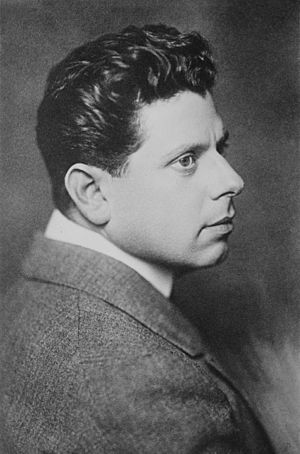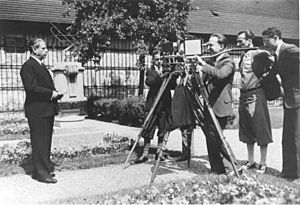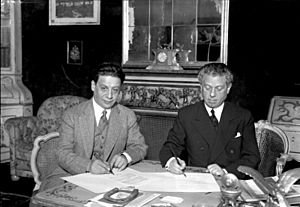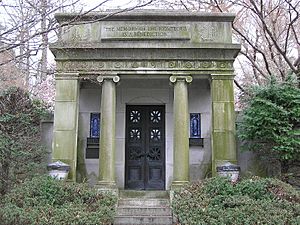Max Reinhardt facts for kids
Quick facts for kids
Max Reinhardt
|
|
|---|---|

Reinhardt in 1911, photograph by Nicola Perscheid
|
|
| Born |
Maximilian Goldmann
9 September 1873 |
| Died | 30 October 1943 (aged 70) New York City, NY, United States
|
| Resting place | Westchester Hills Cemetery |
| Occupation | Theatre director, theatrical producer, actor |
| Spouse(s) | Else Heims (1910–1935; divorced; 2 children) Helene Thimig (1935–1943; his death) |
| Children | Wolfgang Reinhardt Gottfried Reinhardt |
Max Reinhardt (born Maximilian Goldmann; September 9, 1873 – October 30, 1943) was a famous theatre and film director. He was also a producer and manager of theatres. Born in Austria, he became one of the most important directors in German-speaking theatre in the early 1900s. He was known for his new and exciting ways of putting on plays. In 1920, he started the Salzburg Festival in Austria. This festival is still very popular today.
Contents
Max Reinhardt's Early Life and Career
Max Reinhardt was born Maximilian Goldmann in a town called Baden, near Vienna, Austria. His father, Wilhelm Goldmann, was a merchant. Max started training at a bank after school. But he also took acting lessons because he loved the stage.
In 1890, he acted for the first time on a private stage in Vienna. He used the stage name Max Reinhardt. This name might have come from a character in a book. In 1893, he performed at the Salzburg City Theatre. A year later, Reinhardt moved to Germany. He joined the Deutsches Theater in Berlin.
In 1918, Reinhardt bought Schloss Leopoldskron castle in Salzburg. The castle was old and needed a lot of work. He lived there for almost 20 years and carefully fixed it up. Sadly, he had to leave the castle later. This was because of the Nazis and their unfair treatment of Jewish people. The Nazis took the castle after Germany took over Austria in 1938. After World War II, the castle was given back to Reinhardt's family. It later became famous as a filming location for the movie The Sound of Music.
Max Reinhardt's Theatres
In 1901, Max Reinhardt and his friends started a small theatre in Berlin called Schall und Rauch. This was the first of many theatres where Reinhardt worked as a director. He directed plays until the Nazis came to power in 1933.
From 1903 to 1905, he managed the Neues Theater. In 1906, he bought the Deutsches Theater in Berlin. In 1911, he put on a play called The Miracle in London. This play helped him become famous around the world.
From 1915 to 1918, Reinhardt also directed plays at the Volksbühne theatre. After World War I, he reopened the Großes Schauspielhaus in 1919. By 1930, he was running eleven stages in Berlin! He also managed the Theater in der Josefstadt in Vienna.
In 1920, Reinhardt helped create the Salzburg Festival. He worked with famous people like Richard Strauss and Hugo von Hofmannsthal. He famously directed a play called Jedermann every year at the festival. This play is about God sending Death to call a person for judgment. In the United States, he also directed The Miracle in 1924. He put on a very popular version of Shakespeare's A Midsummer Night's Dream in 1927.
A composer named Einar Nilson often worked with Reinhardt. Nilson was in charge of music for Reinhardt's theatres. He would arrange music by famous composers like Mozart and Mendelssohn for the plays. Nilson also wrote original music for plays like Jedermann.
Reinhardt later directed a film version of A Midsummer Night's Dream in 1935. This movie had stars like James Cagney and Olivia de Havilland. The Nazis banned the film. This was because Reinhardt was Jewish, and the film used music by Felix Mendelssohn, who was also Jewish.
After Austria was taken over by Nazi Germany in 1938, Reinhardt moved away. He went to Britain first, then to the United States. He opened the Reinhardt School of the Theatre in Hollywood. Many famous actors learned classical theatre there. In 1940, he became a citizen of the United States.
Max Reinhardt changed German theatre. He used strong staging techniques. He combined stage design, words, music, and choreography in new ways. The Max Reinhardt Seminar in Vienna, a very important acting school, was created based on his ideas.
Max Reinhardt and Film
Max Reinhardt was more interested in films than many other theatre people of his time. He directed films and sometimes produced them. His first film was Sumurûn in 1910. After that, Reinhardt started his own film company. He sold the rights for a film version of his play Das Mirakel (The Miracle). The 1912 film version of The Miracle was a big success worldwide.
Reinhardt made two other films, Die Insel der Seligen (Isle of the Blessed) and Eine venezianische Nacht (Venetian Nights). These films came out in 1913 and 1914. They did not get good reviews from people or the press.
In 1935, Reinhardt directed his first film in the US. It was A Midsummer Night's Dream. He also founded drama schools like the Hochschule für Schauspielkunst "Ernst Busch" in Berlin and the Max Reinhardt Seminar. Many students from these schools became successful in film.
Death and Legacy
Max Reinhardt passed away from a stroke in New York City in 1943. He was 70 years old. He is buried in the Westchester Hills Cemetery in New York. His writings and papers are kept at Binghamton University.
His sons, Wolfgang and Gottfried Reinhardt, were also well-known film producers. His grandson, Stephen Reinhardt, was a lawyer. Another grandson, Michael Reinhardt, is a successful fashion photographer.
Tribute
On November 18, 2015, the Friedrichstadt-Palast in Berlin opened a special memorial. It honors the theatre's founders: Max Reinhardt, Hans Poelzig, and Erik Charell.
Max Reinhardt's Work on Broadway
- Sumurun (pantomime) (1912) – He led the Deutsches Theater of Berlin on a New York tour.
- The Miracle (1924) – He helped write and directed this play.
- A Midsummer Night's Dream (revival) (1927) – He was the producer.
- Jedermann (1927) – He was a co-producer.
- Peripherie (1928) – He was the playwright.
- Redemption (revival) (1928) – He was the director.
- The Eternal Road (1937) – He was the director.
- The Merchant of Yonkers (1938) – This was Thornton Wilder's play.
- Sons and Soldiers (1943) – He was the producer and director.
Films Directed by Max Reinhardt
- A Midsummer Night's Dream (1935)
See also
 In Spanish: Max Reinhardt para niños
In Spanish: Max Reinhardt para niños
- The Continental Players, a group he helped start.
 | Jewel Prestage |
 | Ella Baker |
 | Fannie Lou Hamer |





